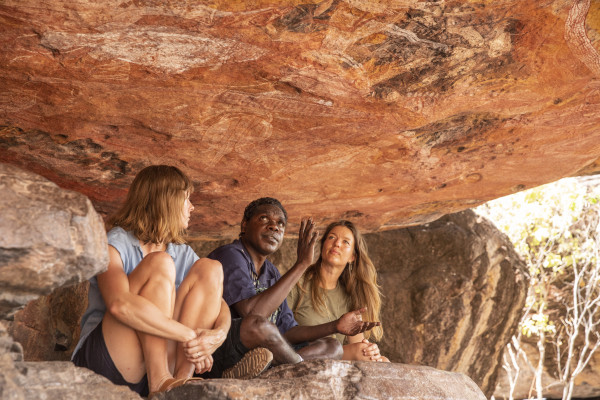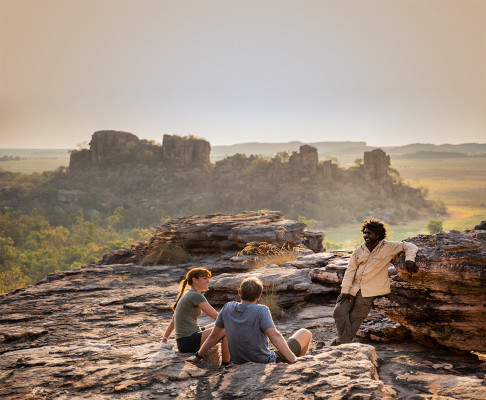Aboriginal and Torres Strait Islander peoples
Aboriginal and Torres Strait Islander (Aboriginal) peoples are the custodians of the world’s oldest living culture. They have practiced sustainability in Australia for over 65,000 years. The NT is home to unique linguistic and cultural diversity, ancient knowledge systems and unique ecosystems.
Traditional Owners and Aboriginal Territorians are experts in the management of land, waters and natural resources with a deep understanding of Country and preserving traditional knowledge for future generations of Aboriginal people.
We can promote and continue to build sound sustainable practices learning from the best of traditional knowledge and contemporary science. Respecting, engaging, and partnering with Aboriginal people will benefit your business, your staff and your visitors together with Aboriginal people and communities.

Inclusive, accessible and collaborative
Sustainable tourism supports strong, connected and diverse communities. It is important to consider how your business positively impacts on your local community, the broader NT community and also the Australian and global community.
How do you minimise negative impact to the community where you operate or visit? How do you create an inclusive and accessible experience for all people, regardless of a person’s appearance, choices, physical limitations, disabilities or age?
Can you provide opportunities for economic development in the region? How do you support young people, culturally and linguistically diverse communities, and the LGBTQI community? There are choices you make every day that can have a positive impact on the place you live and work.

Accessible travel is an opportunity for your business
nights
average length of stay of accessible travel community in the NT1
$
billion
estimated annual spend by travellers with a disability2
%
of domestic visitors to the Northern Territory had a disability or long term health condition in 20211
%
of those with a disability already travel, and more would if products or technologies existed to enable or support them2
1 Derived from Tourism Research Australia National Visitor Survey, 2021.
2 Accessible Tourism in Victoria and Queensland” conducted by Tourism Research Australia, 2017.
Get started
Aboriginal and Torres Strait Islander (Aboriginal) people are the custodians of the world’s oldest living culture. They have practiced sustainability in Australia for over 65,000 years. The NT is home to unique linguistic and cultural diversity, ancient knowledge systems and unique ecosystems. Traditional Owners and Aboriginal Territorians are experts in the management of land, waters and natural resources with a deep understanding of Country and preserving traditional knowledge for future generations of Aboriginal people. We can promote and continue to build sound sustainable practices learning from the best of traditional knowledge and contemporary science.
Respecting, engaging, and partnering with Aboriginal people will benefit your business, your staff and your visitors together with Aboriginal people and communities.
- Provide an accessible and welcoming environment for Aboriginal people, including those visiting from around Australia.
- Respect Aboriginal traditional knowledge, cultural values and obligations.
- Ensure you know whose Country you operate on and acknowledge Traditional Owners through interpretative commentary and/or signage at your business. Research and implement correct protocols when Acknowledging Country.
- Partner with Aboriginal owned businesses to create Aboriginal tourism experiences.
- Engage an Aboriginal consultant or senior community member to provide education sessions with your staff about Aboriginal culture, people, history, language and significant cultural sites and landmarks.
- Use Aboriginal place names in commentary, interpretation and signage whenever appropriate.
- Consider business development opportunities in collaboration with Aboriginal people. Approach Traditional Owners, community leaders and entrepreneurs to introduce yourself, your business and your staff. Listen, learn and ask about their business, social and cultural aspirations.
- Assess the current state of your employee diversity. How many Aboriginal people are you providing employment and training opportunities to? Aim to increase this. Explore Aboriginal workforce grants to fund projects that support employment of Aboriginal people.
- Engage with the creative industries and the arts. Can you employ an Aboriginal artist in residence, provide opportunities for Aboriginal artists to sell their work, or conduct tours to artist workshops and community art centres?
- Source supplies from and actively promote Aboriginal owned businesses. For example, you could purchase consumables from an Aboriginal business, offer seasonal native ingredients sourced from Aboriginal suppliers on your menu, display Aboriginal artwork in guest rooms, and provide opportunities for your visitors to purchase from Aboriginal owned businesses.

Take further action
The below checklist is intended to ignite your inspiration and encourage you to embrace innovative strategies that drive environmental stewardship, empower local communities, and offer genuine and responsible travel experiences.
- Continuously strive to be more inclusive and accessible, and ensure your accessibility features are presented accurately on your website. This may include floorplans, location maps, videos, photos and a list of accessible options.
- Include accessible and inclusive imagery and content on your website and social media.
- Address dietary requirements on your menus and train staff to enquire about allergies.
- Implement a cultural holiday and events calendar, such as NAIDOC Week and Diwali, and aim to plan celebratory, inclusive experiences around these important occasions.
- Prioritise local people for employment opportunities, remembering sometimes that will mean investing in their training or making changes to provide an inclusive and accessible workplace.
- Offer experiences that promotes travel during off-peak and shoulder seasons and to regional and remote areas to support local communities over the entire year and throughout the whole of the NT.
- Promote local retail, hospitality, arts, and culture experiences to your visitors.
